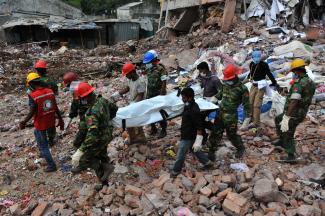News
In brief
 Mohammed Asad/Pacific Press/picture-alliance
Mohammed Asad/Pacific Press/picture-alliance
Safer buildings in Bangladesh
The Alliance for Bangladesh Worker Safety, an umbrella organisation of North American private-sector companies, published its first annual report in July, stating that member companies will ensure financing worth $ 100 million to enable factories to meet international safety standards. Among other things, members will provide loan guarantees.
According to the report, the Alliance has run inspections in all 587 Bangladeshi factories that supply its members, which include industry giants such as Gap and Walmart. The Alliance was started as a response to the industry disasters that caused hundreds of deaths in 2012 and 2013. It cooperates with trade unions, the government of Bangladesh, private-sector companies and trade associations.
The Alliance is proud to have facilitated safety training for 1 million workers and an international trade expo for building and fire safety in Dhaka. The annual report states that empowering workers is crucial and that a confidential helpline has been set up in a test run in 50 factories to allow workers to make complaints discreetly. One of the Alliance’s experts told The Guardian, the London-based newspaper, that it will cost about $ 150 million and take 18 months to bring factories up to international standards in Bangladesh. According to The Guardian, moreover, trade unions are only allowed in about five percent of the 5000 garment factories in Bangladesh so far. The share is said to have doubled within a year. (dem)
Link:
http://www.bangladeshworkersafety.org/
New bank challenges western hegemony
At a summit in Fortaleza in July, Brazil, Russia, India, China and South Africa signed an agreement to establish a new financial institution they call the New Development Bank. Moreover, they decided to set up a joint foreign exchange reserve system to prepare for financial crises. The Contingent Reserve Arrangement will be worth $ 100 billion.
Dilma Rousseff, Brazil’s president, who hosted the event, said the fund will provide “a kind of security net to increase protection for BRICS countries as well as other countries”. Such protection may prove useful if, as economists predict, the eventual rise of interest rates in North America and Europe will have negative impacts on emerging markets (see D+C/E+Z 2013/12, p. 480 f.). Plans to establish a development bank and a reserve system were first announced at the BRICS summit in Durban, South Africa, two years ago. They resulted from dissatisfaction with the World Bank and the International Monetary Fund (IMF). Emerging markets’ influence in these two Washington-based institutions does not reflect the size of their economies and their international relevance.
Xi Jingping, China’s president, said in Fortaleza: “We need to work to improve economic governance at a global level, increase the representations and voice of developing countries.” Vladimir Putin, Russia’s president, said the agreement amounted to “a very powerful way to prevent new economic difficulties”. In a comment on its opinion page, Süddeutsche Zeitung, one of Germany’s leading daily papers, considered the two new financial institutions “a challenge to the west”. The author argued that the west had “dragged its feet on reforming the IMF and the World Bank for so long that the newly powerful emerging markets have become fed up”. Other observers, however, have cast doubt on the BRICS ability to come up with coherent lending policies. They point out that this group of emerging markets does not have much in common apart from shared dissatisfaction with the established system of global governance.
The five participating governments pledged to invest $ 10 billion each in the New Development Bank. The head office will be in Shanghai, and the Bank’s first head will come from India. The BRICS summit announced, moreover, that the Bank’s capital will rise to $ 100 billion in the years to come. (dem)
Total recount
In mid July, Abdullah Abdullah and Ashraf Ghani, the two contenders for the presidency in Afghanistan, agreed to an audit that will check all votes that were cast in the run-off election in June. In the first round of the elections, Abdullah had gained the most votes, but Ghani’s share surged massively in the second round according to the Election Commission. Both candidates have accused the other of trying to rig the election. Averting a major political crisis, John Kerry, the US secretary of state, mediated the agreement according to which there will be a total audit of more than 8 million votes. When D+C/E+Z went to press, the audit was still going on. (dem)